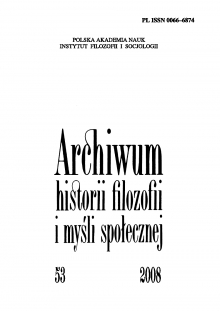Kartezjańskie motywy filozofii oczywistości. Analiza hasła „Evidence” Wielkiej Encyklopedii Francuskiej autorstwa François Quesnaya
Cartesian Elements in Quesnay’s Entry „Evidence” in the Encyclopédie
Author(s): Wojciech StarzyńskiSubject(s): Epistemology, Early Modern Philosophy
Published by: Instytut Filozofii i Socjologii Polskiej Akademii Nauk
Keywords: Kartezjusz; encyklopedia; Quesnay; oczywistość;
Summary/Abstract: The philosophical work of the one of the pioneers of modern economy, François Quesnay (1694–1774), is poorly known and rarely commented. Initially, he raises the philosophical questions on the margin of his medical theory, then, in the fifties he joins the circle of the encyclopedists, and beside of his economical contributions, he writes for Encyclopedy some philosophical texts, one of them seems to be more developed, the article on evidence. In my analysis, I propose to compare it with the thought of the founder of the modern philosophy of evidence recognized as criterion of truth, namely Descartes. Inspite of the severe critique of the doctrine of innate ideas or the cogito as result of methodical doubt, the physiocrate founds his philosophical project on a sensual subjectivity which experiences the initial evidence. Quesnay pursues his philosophical way marked by evidence, with the epistemological analyses on attention, memory, judgment, and will. Finally, he evokes the capital question of the liberty. The human as a sensual subject is not able to confirm his superiority over animal, so his liberty seems to be equal to animal. Quesnay finds solution in supernatural certitude inaccessible to the theoretical knowledge, but experienced in practice which can justify the only human liberty.
Journal: Archiwum Historii Filozofii i Myśli Społecznej
- Issue Year: 53/2008
- Issue No: 53
- Page Range: 65-92
- Page Count: 28
- Language: Polish

